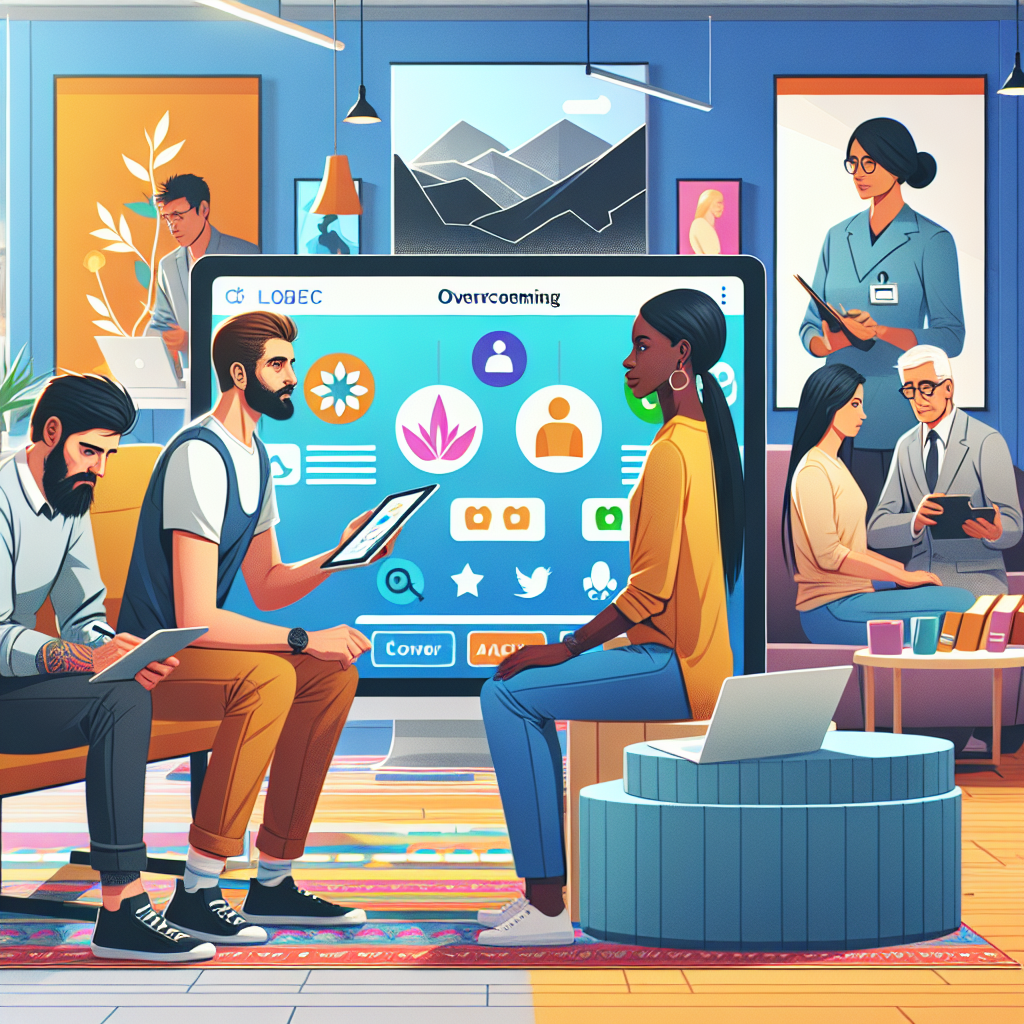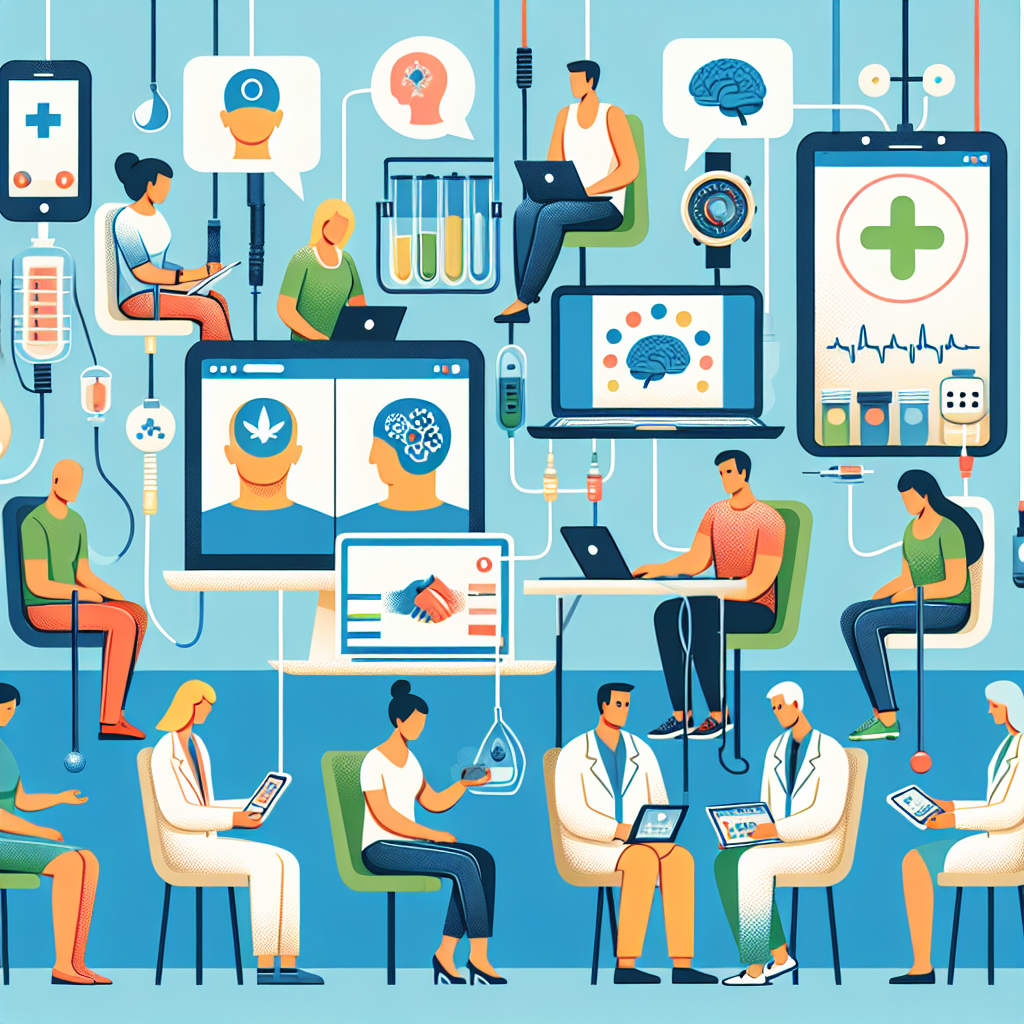-
Table of Contents

“Empowering Recovery: Harnessing Technology for Effective Addiction Treatment”
Introduction
Addiction recovery services increasingly leverage technology to enhance treatment efficacy and accessibility. Digital tools such as telehealth platforms, mobile apps, and online support groups provide continuous, real-time support to individuals in recovery. Telehealth enables remote consultations with healthcare professionals, ensuring that patients receive timely medical advice and counseling regardless of their location. Mobile apps offer features like progress tracking, medication reminders, and coping strategies, empowering users to manage their recovery actively. Online support groups and forums foster a sense of community and shared experience, crucial for emotional support. Additionally, data analytics and machine learning algorithms help personalize treatment plans by identifying patterns and predicting relapse risks. These technological advancements collectively contribute to more comprehensive, accessible, and personalized addiction recovery services.
Innovative Digital Tools Transforming Addiction Recovery Services
In recent years, the landscape of addiction recovery services has been significantly transformed by the integration of innovative digital tools. These advancements have not only enhanced the accessibility and effectiveness of treatment but have also provided new avenues for support and engagement. As technology continues to evolve, it is playing an increasingly pivotal role in helping individuals overcome addiction and maintain long-term sobriety.
One of the most notable technological advancements in addiction recovery is the development of mobile applications designed to support individuals throughout their recovery journey. These apps offer a range of features, including daily motivational messages, progress tracking, and access to virtual support groups. By providing users with constant access to resources and encouragement, these apps help to bridge the gap between in-person therapy sessions and offer continuous support. Moreover, the convenience of having these tools readily available on a smartphone ensures that individuals can access help whenever they need it, fostering a sense of empowerment and self-reliance.
In addition to mobile applications, telehealth services have revolutionized the way addiction treatment is delivered. Telehealth platforms enable individuals to connect with healthcare professionals and counselors from the comfort of their own homes, eliminating barriers such as geographical distance and transportation issues. This increased accessibility is particularly beneficial for those living in rural or underserved areas, where traditional in-person treatment options may be limited. Furthermore, telehealth services often offer flexible scheduling, allowing individuals to receive support at times that are most convenient for them. This adaptability not only enhances the overall treatment experience but also encourages greater participation and commitment to the recovery process.
Another innovative digital tool that has gained traction in addiction recovery is virtual reality (VR) therapy. VR therapy immerses individuals in realistic, controlled environments where they can safely confront and work through triggers and cravings. By simulating real-life scenarios, VR therapy helps individuals develop coping strategies and build resilience in a safe and supportive setting. This experiential form of therapy has shown promising results in reducing anxiety and improving emotional regulation, making it a valuable addition to traditional treatment methods.
Moreover, online communities and social media platforms have become powerful tools for fostering connection and support among individuals in recovery. These digital spaces provide a sense of belonging and camaraderie, allowing individuals to share their experiences, offer encouragement, and celebrate milestones together. The anonymity and accessibility of online communities can be particularly appealing to those who may feel stigmatized or isolated in their recovery journey. By creating a network of support that transcends physical boundaries, these digital platforms help to reinforce the idea that no one has to face addiction alone.
Incorporating technology into addiction recovery services also allows for more personalized and data-driven approaches to treatment. Wearable devices, such as fitness trackers and smartwatches, can monitor physiological indicators like heart rate and sleep patterns, providing valuable insights into an individual’s overall well-being. This data can be used to tailor treatment plans and identify potential areas of concern, enabling healthcare providers to offer more targeted and effective interventions. Additionally, the use of artificial intelligence and machine learning algorithms can help predict relapse patterns and suggest preventative measures, further enhancing the efficacy of treatment.
As we continue to witness the transformative impact of technology on addiction recovery services, it is clear that these digital tools are not just enhancing treatment but are also inspiring hope and resilience. By making support more accessible, personalized, and engaging, technology is empowering individuals to take control of their recovery and build healthier, more fulfilling lives. The integration of these innovative tools represents a promising step forward in the ongoing battle against addiction, offering new possibilities for healing and growth.
The Role of Telehealth in Modern Addiction Treatment Programs
In recent years, the landscape of addiction recovery services has been significantly transformed by the advent of technology, particularly through the use of telehealth. This innovative approach has not only expanded access to treatment but also enhanced the quality and effectiveness of care for individuals battling addiction. By leveraging digital platforms, telehealth has become a cornerstone in modern addiction treatment programs, offering a lifeline to those who might otherwise struggle to receive the help they need.
One of the most profound impacts of telehealth in addiction recovery is its ability to break down geographical barriers. For many individuals, especially those living in rural or underserved areas, accessing traditional in-person treatment can be a daunting challenge. Telehealth bridges this gap by providing remote access to healthcare professionals, allowing patients to receive counseling, therapy, and support from the comfort of their own homes. This convenience not only reduces the logistical burdens associated with travel but also ensures that help is available to a broader population.
Moreover, telehealth offers a level of flexibility that is often crucial for individuals in recovery. Many people struggling with addiction have demanding schedules, whether due to work, family responsibilities, or other commitments. Telehealth services can be tailored to fit these schedules, offering appointments outside of typical office hours and reducing the need for time-consuming commutes. This adaptability makes it easier for individuals to consistently engage with their treatment plans, which is essential for long-term recovery.
In addition to accessibility and flexibility, telehealth also fosters a sense of privacy and anonymity that can be particularly beneficial for those dealing with the stigma often associated with addiction. The ability to participate in therapy sessions from a private setting can alleviate some of the anxiety and embarrassment that might deter individuals from seeking help. This increased comfort can lead to more open and honest communication between patients and healthcare providers, ultimately enhancing the effectiveness of the treatment.
Furthermore, telehealth platforms often incorporate a range of digital tools and resources that can support recovery. For instance, many programs offer mobile apps that provide educational materials, self-assessment tools, and progress tracking features. These resources empower individuals to take an active role in their recovery journey, fostering a sense of ownership and accountability. Additionally, some telehealth services include virtual support groups, where individuals can connect with others who are facing similar challenges. This sense of community and shared experience can be incredibly motivating and reassuring.
Another significant advantage of telehealth in addiction treatment is the ability to provide continuous care and support. Recovery is a long-term process that requires ongoing attention and intervention. Telehealth enables healthcare providers to maintain regular contact with their patients, offering consistent check-ins and follow-up sessions. This continuous engagement helps to monitor progress, address any emerging issues promptly, and adjust treatment plans as needed. It also provides a safety net for individuals who may be at risk of relapse, ensuring that support is always within reach.
While telehealth is not a one-size-fits-all solution and may not replace the need for in-person care entirely, it undoubtedly represents a powerful tool in the arsenal of addiction recovery services. By enhancing accessibility, flexibility, privacy, and continuity of care, telehealth has the potential to transform the way we approach addiction treatment. As technology continues to evolve, so too will the opportunities to support individuals on their path to recovery, offering hope and healing to those who need it most.
Q&A
1. **Question:** How do addiction recovery services use mobile apps for treatment?
**Answer:** Addiction recovery services use mobile apps to provide 24/7 support, track progress, offer educational resources, and facilitate communication with counselors and support groups.
2. **Question:** How is telehealth utilized in addiction recovery services?
**Answer:** Telehealth is utilized in addiction recovery services to offer remote counseling, therapy sessions, and medical consultations, making treatment more accessible and convenient for patients.
Conclusion
Addiction recovery services leverage technology through telehealth platforms, mobile apps, and online support groups to provide accessible, personalized, and continuous care. Telehealth enables remote consultations and therapy sessions, ensuring consistent support regardless of location. Mobile apps offer tools for tracking progress, managing triggers, and accessing educational resources. Online support groups and forums foster community and peer support, crucial for long-term recovery. These technological advancements enhance the reach, efficiency, and effectiveness of addiction treatment, making it more adaptable to individual needs and circumstances.



